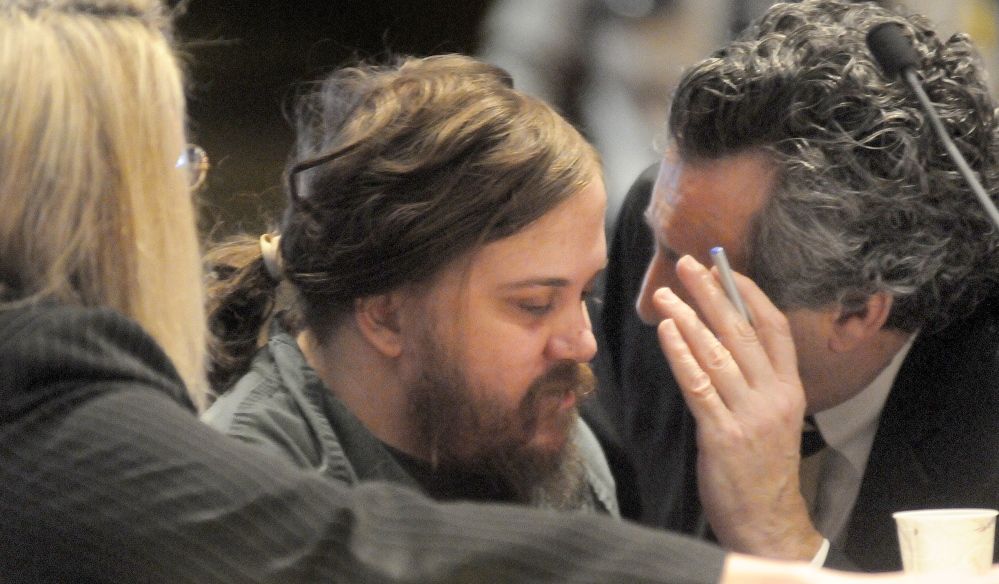A Sidney man serving a 50-year prison sentence for repeated sexual assaults on a 4-year-old that he recorded on his cellphone wants a new trial.
Eric L. Bard’s attorneys argued Wednesday in front of the Maine Supreme Judicial Court that he deserved it, partly on the basis that the trial court judge had a conversation with the prosecutor about the case without defense attorneys present.
On Wednesday, questions by the supreme court justices indicated they were particularly concerned about that conversation and what, if anything, should be done about it.
Bard, now 28, is being held at the Maine Correctional Center in Windham and was not present at the hearing in the Cumberland County Courthouse in Portland.
Bard’s attorneys also argued an earlier appeal at Maine Supreme Judicial Court, also known as the Law Court, over issues regarding the admittance of evidence found on Bard’s cellphone, his competence to stand trial, and the length of the sentence.
In both appeals, Assistant Attorney General Paul Rucha maintained the trial court was correct in its rulings.
Bard’s attorneys had asked that the ruling in that appeal, which was argued in September 2016, be put on hold pending a ruling in the appeal over Bard’s bid for a new trial.
That request had been denied in September 2017 by Superior Court Justice G. Arthur Brennan following a series of hearings.
Bard’s trial in Augusta was cut short when he pleaded guilty on the second day to 11 charges of sexual exploitation of a minor, seven charges of gross sexual assault on a child under 12, two charges of unlawful sexual contact and one charge of assault. Those pleas were conditional on the issues being appealed to the Law Court.
The trial judge, Superior Court Justice Donald Marden, explained at the time that if the rulings by the Law Court indicated he was wrong in pre-trial decisions, Bard could withdraw his guilty pleas.
The offenses occurred between Dec. 1, 2011, and April 30, 2012, while Bard was baby-sitting the girl in Augusta. Investigators say he had befriended the child’s mother in 2010.
The investigation began when another mother seeking daycare services for her child in May 2012 came across an ad on Craigslist offering to babysit, photograph and bathe children. She reported it to Maine State Police, who learned that Bard had placed the ad.
Defense attorneys Ronald Bourget and Gina Yamartino have maintained that Bard is too intellectually compromised to fully understand what he was doing was wrong.
A series of forensic psychologists has evaluated Bard for issues of competency to enter a plea to the charges and to go to trial. After reading the reports and hearing from some of them, Marden found that Bard was competent.
On Wednesday, attorney Gina Yamartino said that the private conversation held June 23, 2014, between Marden and District Attorney Maeghan Maloney violated Bard’s “due process guarantee of an impartial judge.”
Yamartino added, “It is the bedrock of our entire judicial system.”
Yamartino also said that when defense attorneys heard rumors about that conversation in August 2014 and asked the judge about it directly, “he inexplicably denied any adversary action in the case.”
Transcripts of the meeting show the conversation centered on the release of an affidavit that had been impounded and calls by Maloney to agencies considering supervising Bard while he was on bail. The judge had issued a gag order in the case a week or so earlier that prohibited attorneys, court personnel, potential witnesses and law enforcement officers from commenting on Bard’s case.
Chief Justice Leigh Saufley asked why the defense didn’t seek a transcript of the conversation at the time.
“I’m not sure, your honor,” Yamartino said. “I think that counsel trusted the judge.”
Associate Supreme Court Justice Ellen Gorman said, “Our concern is that collegiality has led to an abject error in this case.”
She asked, “What should we do if this was an error by defense counsel?”
Yamartino said it was not.
Saufley suggested the issue could be pursued in a post-conviction proceeding rather than a new trial, and Gorman asked why Bard did not “simply ask to withdraw his plea.”
“I don’t believe that would be the proper thing to do,” Yamartino responded. “I think there was a clear risk of objective bias here, and I think a new trial is what he needs.”
Rucha suggested that the conversation between the judge and the district attorney should be considered in the context of the entire case, and argued in his brief that Bard waived his right to raised this issue because the defense knew about the conversation prior to Bard entering the conditional guilty pleas.
The Law Court issues its rulings in writing at a later date.
Betty Adams — 621-5631
Twitter: @betadams
Comments are not available on this story.
Send questions/comments to the editors.



